Archive for the ‘Trends’ Category
 |
27. November 2012 – 13:32 by Zebralog
|

/Please note: This post is not from Hans Hagedorn, but from Steffen Albrecht @ Zebralog…/
Posted in Events, Projects, Trends | No Comments »
 |
19. June 2012 – 11:06 by John Heaven (TuTech Innovation GmbH)
|
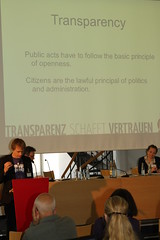
Daniel Lentfer presents the Transparency Law at the PEP-NET Summit 2012
Campaigners for a local transparency law, the so-called Transparenzgesetz, can look forward to a summer watching the football with a cool bottle of Astra and a Bratwurst. Expecting stiff resistance from the local authority, they had planned to spend the next few months preparing for the next round of a local citizen’s initiative, which would have required them to collect thousands of signatures in order to force a referendum. But to many people’s surprise, an adapted version of the law was passed last week.
Following negotiations with all parliamentary party groups and the campaign’s initiatiors (Mehr Demokratie, Transparency International and Chaos Computer Club), a text was agreed upon and passed on 12th June. By introducing an inventory of publicly held information, including data, and obliging public servants to open information by default, the law will go a long way to increasing transparency in the local authority. The types of information that are included in the duty to publish are, amongst others, contracts for public services, official statistics, geodata and spatial development plans. Where there are compelling reasons, such as data protection or the protection of sensitive business information, the duty does not apply.
This law supersedes the Freedom of Information Law, passed in 2009. Hamburg’s wide range of instruments for involving citizens extend from citizens’ initiatives on a local level to livestreaming parliamentary proceedings, via the online spatial planning consultation system that TuTech developed with the city. The Transparency Campaign and the Parliament are in agreement that Hamburg is set to become Germany’s most transparent state, its transparency capital. As far as I know, this is the best example of open data and transparency being pushed through by a civil society campaign.
Posted in News, open data, Trends | No Comments »
 |
22. May 2012 – 10:09 by Asociacion Ciudades Kyosei / Pedro Prieto-Martin
|
 This week Avaaz, the “campaigning community bringing people-powered politics to decision-makers worldwide’, started the beta-testing of its community petitions platform, which allows anybody to launch a petition in a question of minutes. This new systems empowers anybody to make use of the streamlined processes and tools that have allowed Avaaz to grow its user base to more than 14.400.000.
This week Avaaz, the “campaigning community bringing people-powered politics to decision-makers worldwide’, started the beta-testing of its community petitions platform, which allows anybody to launch a petition in a question of minutes. This new systems empowers anybody to make use of the streamlined processes and tools that have allowed Avaaz to grow its user base to more than 14.400.000.
 Avaaz thus follows the recente move from change.org, the “social action platform that empowers anyone”, which just two weeks ago ‘absorved’ the Spanish platform “Actuable” and is now planning to translate its ‘petition making system’ to many other languages to really extend its reach worldwide.
Avaaz thus follows the recente move from change.org, the “social action platform that empowers anyone”, which just two weeks ago ‘absorved’ the Spanish platform “Actuable” and is now planning to translate its ‘petition making system’ to many other languages to really extend its reach worldwide.

Each of these platforms claims to have promoted petitions that forced very important political ‘actors’ to react: from Hillary Clinton to Presidente Morales, from Bank of America and Apple to Hilton Hotels.
 This is an interesting ‘tectonic’ move in the realm of (e)Participation, which we should follow closely. It is, additionally, much related to the discussion about “Sticks and Carrots” we hold in Pep-Net’s blog a year ago.
This is an interesting ‘tectonic’ move in the realm of (e)Participation, which we should follow closely. It is, additionally, much related to the discussion about “Sticks and Carrots” we hold in Pep-Net’s blog a year ago.
We were then reflecting about questions like: is it better to praise “good deeds” of Corporation and Politicians, or is it better to warn and punish them when they “misbehave”? Why not both things at the same time?
Anita Roddick, the founder of the Body Shop, reported that once an executive of Shell told her: “We don’t fear regulation, we only fear consumer revolt”
Well: it is clear now that consumer and citizens are getting better at revolting and exerting pressure. Change is happening out of anybody’s reach, and (e)Participation is slowly “getting teeth”, which soon will be able to hurt enough as to influence behaviour: if you do not want your brand reputation to get ruined… you better behave!!! And this applies to corporation as much as political actors.
The promise of a ‘Future Goverment’ that becomes FAST (flatter, agile, streamlined and tech-enabled) -which was delivered in the last World Economic Forum- starts to be truth. But, for sure, it is not government who is promoting it. It is NGOs and CSOs. It is citizens.
It is important to note that the technology behind these petition plattforms is very, very simple. The concepts and processes of use are also not sci-fiction. But for sure, this kind of powerful, sustainable and social minded (e)Participation was rarely promoted by our Governments’ Innovation Support Actions. Instead of an impact oriented eParticipation research, put at the service of Civil Society, a Government- and Academia-centred approach was preferred. And thus eParticipation has just advance by little steps.
It is a pitty, because these platforms are now out there, growing. They were created with less (or ‘no’) involvement of eParticipation researchers. And that means that we do not have easy access to the very valuable information about eParticipation that these systems are generating (about pattern and reasons of use, users’ demographics, typologies of action, success rates, etc).
We should reflect about this. We have not so many more opportunities to miss. The field is developing faster and faster. Do we want to be part of it?
Posted in good practice, ICT, inclusion, Tools, Trends, Visions | No Comments »
 |
29. March 2012 – 13:11 by John Heaven (TuTech Innovation GmbH)
|

Alenka Krek-Poplin
Having studied Surveying in Ljubljana before specialising in Geographical Information Systems through work and academic study in Austria, the US and Germany, Prof. Alenka Krek-Poplin is co-founder of Hamburg’s Digital City research group, which focuses on the application of spatial data-modelling to city planning. She writes, researches and teaches on computer-aided participation in spatial planning at the HafenCity University Hamburg.
Alenka’s work focuses on how, by adding an element of fun and enjoyment (or joy) to spatial planning, it can be made more interactive and compelling and thus increase levels of participation. Her recent article “Playful public participation in urban planning: A case study for online serious games” explores aspects such as story-telling, sketching and drawing, and digital games that have the potential to make public participation (in my words) easier and less boring.
The example she draws upon in the article, Nextcampus, was a prototype of a game that she and some of her students designed and simulated. The prototype game dealt with the suggested relocation of the University of Hamburg, which has been a hot topic in recent years.
Added to this, she has conducted several projects that explore the use of public participation through geographical information systems. One of these projects was a survey of how people use the waterways around Wilhelmsburg, an island in Hamburg’s River Elbe. Participants were asked whether they carry out certain activities and were able to draw on the map, stating where they engage in them.
The most recent example, sowillichleben.com, is a website built by students to enable them to influence the building of their halls of residence in a game-like manner. One of the ways students were able to express their wishes was to stick virtual notes on areas that represented private room, communal area, and surrounding area. So they could, for example, stick a note with “privacy” on the part representing their room, and “meet new people” on the part representing the communal areas. She has also been involved in a project that enabled citizens to plan the layout of a town square using 3D objects.
In her paper describing Nextcampus, Alenka details some of the criticism that the model attracted from some experts who were asked to evaluate it. One of these was the difficulty in distinguishing between when participants are just playing, and when they are serious about what they are suggesting. I am looking forward to discussing this point at the PEP-NET Summit because it acknowledges a part of participation that I feel we pay much too little attention to. We tend to ignore that citizens always have participated in discussions with no expectation, or even desire, of their discussions leading to some kind of result, for example talking about politics at the pub, going to events to hear about political topics but not doing anything about them, and taking part in flashmobs; but this type of not-for-real participation is essential and, I suspect, one way or another leads to a much healthier public discourse and ultimately better public decisions.
Of course the other half of the equation is what to do with the results that people mean seriously, and we will be talking about that too!
For more information about the PEP-NET Summit and to register, visit https://amiando.com/pep-net. You can also find information at https://pep-net.eu/the-pep-net-summit-out-in-the-open/
Posted in News, Trends | No Comments »
 |
23. February 2012 – 15:54 by John Heaven (TuTech Innovation GmbH)
|
Mehr Demokratie e.V., Transparency International and the Chaos Computer Club are campaigning for the adoption of a local law that would give Hamburg citizens and charitable organisations enhanced access to previously confidential information. Daniel Lentfer from Mehr Demokratie, a not-for-profit organisation that campaigns for more direct democracy in German politics, will present the Transparenzgesetz at the PEP-NET Summit on 14th May.
The proposed transparency law was drafted using a wiki, which was open for anyone who wanted to to participate. It calls for a central information register, listing all of the city’s official publications; a duty to publish, which includes public data; and the extension of the right to information to voluntary organisations, especially campaigning organisations and not merely private individuals.
The campaign argues that such a law would reduce corruption, reduce wasting of taxpayers’ money, increase trust in politicians and the local authority, simplify administrative procedures and make participation easier.
Mehr Demokratie e.V. successfully collected the 10,000 valid signatures required for a local Citizens’ Initiative and the state parliament’s judicial affairs committee will decide whether to accept the law on 28th February. Mehr Demokratie is preparing for it to be rejected, in which case they will have to collect a total of 62,000 valid signatures within three weeks to force a local referendum.
Posted in Events, News, open data, Trends | No Comments »
 |
2. December 2011 – 15:02 by John Heaven (TuTech Innovation GmbH)
|

Protecting citizens' data (photo by jaime.silva, Flickr)
The Region of Hanover (yes, that’s the correct English spelling) has dropped its Facebook page due to data protection concerns. Kommune21, an E-Government magazine, reports that recent statements from some of Germany’s regional Data Protection Commissioners (the best known example coming from Schleswig-Holstein) led the region to take drastic steps, despite the advantages of the Facebook page in reaching younger users.
As Berlin celebrates its millionth Facebook fan, this will continue to keep concerns about data protection protection high on the agenda. The Schleswig-Holstein Data Protection Commissioner’s controversial findings earlier this year ordered all organisations in his state to drop their Facebook pages and cease to use the Facebook ‘like’ button on their websites. This is because data about users is sent to servers in the US and, according to the Commissioner, not enough is done to inform users about what data are collected and what happens to them.
The Commissioner also raised concerns about the use of the Facebook “Like” plugin, which allows users to recommend a page to their Facebook friends by clicking on a button on the website concerned instead of pasting a link onto Facebook. It would appear that information about users, even those who do not have Facebook accounts, are sent to Facebook and logged-in users of the social networking site can be tracked across websites.
At the start of September, Heise, a German publisher, got itself into trouble with Facebook for developing a ‘Like’ plugin that first has to be activated by the user, in order to avoid sending any data to Facebook without the user’s consent. The dispute appears to have been resolved since Heise developed an alternative logo and only shows the Facebook logo once the user has clicked on it to activate the sharing function. You can see it in action on heise.de (the ‘Empfehlen’ button at the end of each article).
Posted in News, Trends | No Comments »
 |
6. October 2011 – 18:31 by John Heaven (TuTech Innovation GmbH)
|
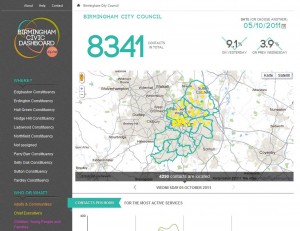
Birmingham Civic Dashboard screenshot
In its recent consultation document ‘Making Open Data Real’, the UK Government expresses high hopes for open data, heralding it as possibly “the most powerful lever of 21st century public policy”. Following several years of open data advocacy, activism and hack days, in the UK open data is moving towards the mainstream thanks to unanimous backing from the coalition government and the opposition.
The latest move in open data comes from Birmingham City Council, which today launched its ‘Civic Dashboard’. This is a web site publishing raw customer services data along with a slick visualisation, which was made possible by a grant that Digital Birmingham received as a result of winning a competition run by the National Endowment for Science, Technology and the Arts (NESTA).
The Civic Dashboard draws its data from the customer service centre set up as part of the Council’s Business Transformation programme. An extract of data about all customer enquiries, whether by telephone, internet or email, is recorded by the customer relationship management system and fed into the Civic Dashboard in an aggregated (anonymised) form once per day. Where the data is geocoded, it can be presented on a map to show how many contacts originate from a particular ward or constituency. You can even see which channels the enquiries come through, which shows that the Council receives far more enquiries by telephone than through other channels.
This is an important step towards bridging the gap between eGovernment and ‘weGovernment’. Coming from the Council that was heavily criticised for spending £2.8m on its website as part of its eGovernment transformation, especially by Birmingham’s vocal social media users, opening up the data that is produced in the background shows what the new infrastructure can do beyond serving up static content. Doubtless there are many more datasets that exist as a result of the transformation programme, and if these are released in the future, perhaps Brummies will feel they got a better deal out of transformation than they first thought.
This itself is quite a paradox: such a handover of control to the citizen wouldn’t have happened if it weren’t for the huge transformation programme because IT is absolutely necessary for the collection of data in a reusable form.
Read the rest of this entry »
Posted in good practice, News, open data, Trends | 1 Comment »
 |
26. September 2011 – 13:52 by John Heaven (TuTech Innovation GmbH)
|
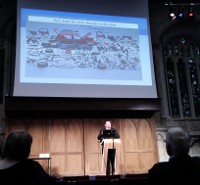
e.gov conference, Belfast
At the “Open.gov & e-participation” conference in Belfast on 22nd September I said a few off-the-cuff words about open data in Germany before presenting DEMOS-Plan, the spatial planning consultation software that we have developed together with the local authority in Hamburg.
I think it’s fair to say that the open data debate is not quite as far ahead in Germany as it is in the UK. Although there are good examples (MOGDy, Apps4Berlin, Berlin’s new open data portal, the Bremen open data recommendation) here of local authorities and third parties opening their data and demonstrating what they can do, the UK government’s commitment to opening data as demonstrated by data.gov.uk and its recent consultation on ‘Making Open Data Real‘ show that the debate has moved on from ‘whether’ to ‘how’.
However, I argued, based on experience of eParticipation more generally, when Germany does catch up it will commit to well thought-out solutions that are implemented sustainably. The examples I used were Hamburg’s social media guidelines — which I have previously mentioned on PEP-NET and which describe in detail how Hamburg handles social media — and our own DEMOS-Plan, which is fully integrated into Hamburg’s infrastructure, is ‘business as usual’ because it will from now on be used for all local plan consultations in Hamburg, and is backed up by a procedure that gives citizens and stakeholder organisations a legal right to participate in urban planning, both online and offline.
If things happen in a similar way, I think open data will take off in Germany and many of the same issues that the UK is wrestling with will apply: so it will be necessary to think about the costs of opening datasets and to decide on which ones have priority. How do you decide which datasets are worth the investment? Do you assume that businesses will be built on the data public bodies publish, or do you prescribe a specific purpose that data should be used for? The UK government is quite clear in its white paper that enabling service users to make a more informed choice about which providers they use is an important motivation.
One issue that I think will be get more attention in Germany than in the UK is data protection. You get a good idea of how jealously Germans guard their privacy if you have a look around a residential area with Google Street View — in some cases, so many houses are blurred out that it is pretty much useless. Or see the Unabhängiges Landeszentrum für Datenschutz Schleswig-Holstein’s (Data-protection Commission for the State of Schleswig-Holstein’s) decision that Facebook pages and ‘like’ buttons on third-party websites contravene data protection law and should be stopped with immediate effect. In this context, I find it difficult to foresee Germany adopting an ‘open by default’ policy with regards to data. The risk that personal data could slip through the net could be too high.
So I think the German public sector is working on these issues and when the strategy is nailed down, it will be embedded for the long term. In short, open data will at some point be business as usual, even if it Germany doesn’t do ‘open by default’.
Posted in open data, Trends | 1 Comment »
 |
28. July 2011 – 16:49 by Asociacion Ciudades Kyosei / Pedro Prieto-Martin
|
“The e-(R)evolution will not be funded. An interdisciplinary and critical analysis of the developments and troubles of EU-funded eParticipation” is the title of a paper that our association recently wrote as part of our research and knowledge dissemination efforts. The article is meant to be properly published soon, but some bureaucratic issues have delayed its release more than we can wait.
Because this paper needs to be read and, more important, discussed while its analyses are still current.
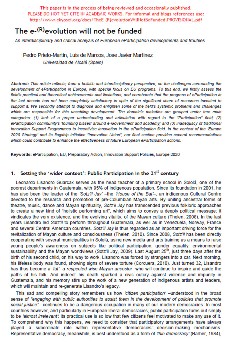 Thus, we have decided to make it provisionally available through PeP-NET. To start such a conversation, what better place than PeP-NET, the Pan European eParticipation network?
Thus, we have decided to make it provisionally available through PeP-NET. To start such a conversation, what better place than PeP-NET, the Pan European eParticipation network? 
We have spent many hundreds of hours researching and writing the paper, as we struggled to make sense of the developments and “under-developments” of eParticipation in the last ten years.
Our appraisal is based on an extensive and interdisciplinary analysis of distinct relevant sources, which included the most recent reports, articles and literature reviews dealing with eParticipation research, practice and theory, as well as projects’ deliverables and evaluations, related databases, and our direct examination of eParticipation systems.
We had to resort to a very varied bunch of disciplines (from history and medicine to Mayan performing arts; seriously!!  ) to be able to achieve a comprehensive understanding of the field’s challenges… and to make a compelling exposition of them.
) to be able to achieve a comprehensive understanding of the field’s challenges… and to make a compelling exposition of them.
The paper ended up being “quite controversial”, as our assessment of eParticipation came to suggest that some of the problems that have hampered its progress have a systemic, overarching character: that kind of ‘elephant in the living room’-issues whose very existence tends to be denied because of their complexity or the embarrassment they cause and, as a result, cannot normally be acknowledged or discussed, let alone get properly sorted out.
Examples of the “embarrassing questions” the paper poses are:
- How can it be that after 10 years… all relevant ‘agendas’ of eParticipation research are still reported as underdeveloped?
- And how can it be that even the most basic questions –for example: the relation of Participation and eParticipation, or the understanding of the dual nature of eParticipaton as something that can be driven by authorities or by citizens themselves– remain unsolved?
- More than 187 millions of Euros were invested in the last ten years to promote experimentation in the field, so… where are the results? Where are the breakthroughs and the research milestones? Can we feel satisfied with just some “vague confirmations” of ideas that 10 years ago could already have been easily guessed?
Through the paper, we have done our best to constructively diagnose eParticipation and to propose some treatments for the field’s maladies. But our perspective and understanding are necessarily limited: the real “treatment” for those problems would require a reflection process that involves the whole eParticipation community.
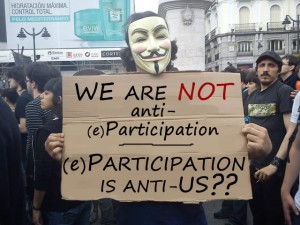 We see this paper as an urgent “call for self-reflection” and consider it a “MUST READ” for anyone involved in European eParticipation: from the officials working at EC’s Directorate for Information society and Media, to the researchers, practitioners, NGOs, public workers, citizen associations… and even any interested European citizen.
We see this paper as an urgent “call for self-reflection” and consider it a “MUST READ” for anyone involved in European eParticipation: from the officials working at EC’s Directorate for Information society and Media, to the researchers, practitioners, NGOs, public workers, citizen associations… and even any interested European citizen.
Therefore, we would like to encourage all our PeP-NET friends and in general all people with interest in eParticipation… to have a look at the paper during this nice summer weekend. 
Anyone who feels “touched” by any of the paper’s claims and argumentations… should speak up and comment to this post. It doesn’t matter if it is to support, extend or complement our asseverations, or to oppose, challenge or further qualify them… please, share your views.
PeP-NET was meant to be a HUB for the conversations around eParticipation. So… let’s discuss. It is important that the issues we showed –be them real or imagined– are talked about, and possibly acted upon.
The environment where we operate is moving. Moving faster and faster. And in the context of the ‘Europe 2020 Strategy’ and its flagship initiative “Innovation Union”, which aims to renew EU’s “Research and Innovation Funding Programmes”, the most important question we need to answer is: “What do we do now??”
For sure, we could keep pretending that there is NO elephant in the living room. Stay in our “academic” Ivory Tower, and just continue doing as we did so far… while we wait for the “barbarians of eParticipation” to arrive, change the democratic landscape by really integrating ICT in governance… and make fools of all us. PeP-NET subscribers included. 
But in our association we want to believe that we, the European eParticipation Community, could do much better than that.
So… no more to say!! Thank you very much for your attention. We hope some of you enjoy reading of our paper and some exchange of ideas can happen afterwards.
—– ADDITION: A CONCEPTUAL MAP SUMMARISING PAPER’S KEY FINDINGS —–
Several people asked for a “summary” version of the paper. Here you have a JPG image (2,5 Mbytes) displaying a Conceptual Map that summarises the paper’s key findings.
I recommend you to save the file first, and then open it with an image editor (like Office Picture Manager) to watch it. It’ll be more easy for you to zoom in and out in the different parts of the image.
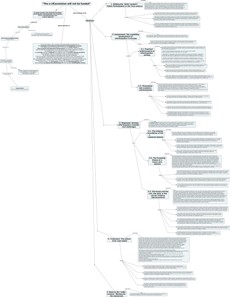
Posted in ICT, Projects, Tools, Trends, Visions | 24 Comments »
 |
21. July 2011 – 17:45 by John Heaven (TuTech Innovation GmbH)
|

Me, posing in Second Life
This morning I went for a walk in a place on the other side of the channel which doesn’t exist yet. All without leaving my desk. Thanks to Birmingham’s Second Life model of the Library of Birmingham, the real life version of which is due to be opened in 2013, I was able to have a look at what they’re planning.
A couple of months back I blogged about Birmingham’s virtual model of the Library of Birmingham, then in the later stages of development. Earlier this month the Virtual Library went live, meaning that people from Birmingham (and beyond) can see a virtual model of the library that is scheduled to open in 2013 and let the developers know what they think.
As a Brummie, I recognised Centenary Square, and it was clear where the new library will be located and easy enough to get in (although Second Life can take a bit of getting used to before you start walking like you’re sober). Almost all areas of the library are accessible, and you can even choose whether to take the escalators or teleport to the different floors. It gives a good feel of how the library will eventually look and I noticed that some people had already commented on the building: one visitor was “concerned about the floor — it might do your head in!” and someone advised “Make sure the tables are able to be used by disabled people and children.”
As I mentioned in my previous article, the Virtual Library launch is being accompanied by a range of activities to ensure that it doesn’t go unnoticed in Second Life. Regular workshops are being held at the current library for the public, who are then able to use the computers at the library to access Second Life or go home and try it themselves. Those who don’t fancy signing up for Second Life can either view fly-through videos of the library or submit their comments using questionnaires.
For more information about the launch of the Virtual Library, you see the press releases from Birmingham City Council and from Daden, the company that created the model. I’m going to get an update from library staff after their current phase of outreach work, so watch this space!

Can you spot me?
Posted in good practice, News, Projects, Trends | 2 Comments »






















